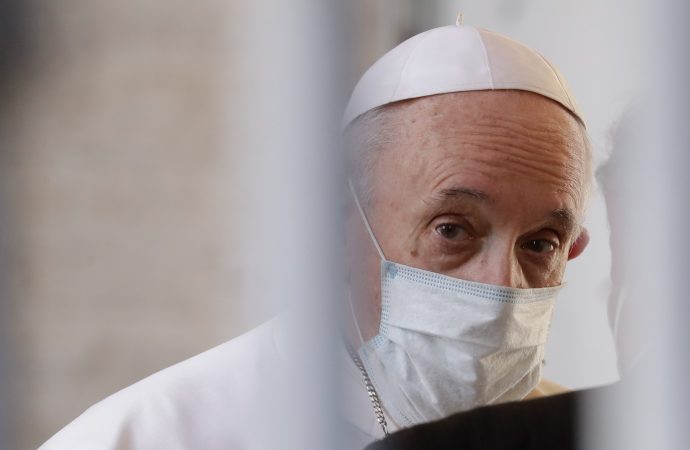During an event that connected him with youth on three continents, Pope Francis said Thursday that the political health of the world can be gauged by whether there are wars, and regretted that there are even priests who give their blessings to weapons.
“When they talk to me about the state of politics in the world, I say: look where there are wars, there is the defeat of politics,” Francis said while on the line with a young woman from Iraq. “A policy incapable of dialogue is defeated. And it also makes me sad to see when priests bless weapons.”
The pope’s words came during a two-hour event hosted by Scholas Occurentes, a papal foundation he instituted in Argentina in 2001, which works on fostering a culture of encounter in schools throughout the world.
Through video link, which is how the Scholas events have worked since their first event in the Vatican back in 2014, Francis interacted with people from Sydney, Valencia and Washington D.C., though the Washington group had technical difficulties and was connected only by video with no audio. All three cities are places where Scholas Occurentes has offices.
Among those taking part were Cardinal Antonio Canizares of Valencia, and Archbishop Jose Gomez of Los Angeles, president of the U.S. bishops conference. Cardinal Wilton Gregory of Washington was supposed to speak, but the failure in the connection prevented this from happening.
“In these difficult times, Scholas is an extraordinary element to strengthen the coexistence among young people, to share the essential values of God’s plan for humanity,” Gomez said, speaking in Spanish.
“We are very happy because we started a new group in Washington DC, which will help us to unite the youth of the East and West of the United States,” he said. “We hope that this step will help us to invite all the youth of the United States to share with each other and with the youth of the whole world, and to promote peace and solidarity in these difficult times, and always.”
Scholas Ocurrentes describes itself as an “international organization of pontifical right. It operates around 400,000 educational centers in 190 different countries. It is financed through public and private donations and claims to strive for “the culture of encounter”.
A school of politics rooted in Fratelli Tutti
Among the things launched Thursday was the “Fratelli Tutti Political School,” aimed at forming future politicians with a program that revolves around the latest papal encyclical dedicated to the theme of human fraternity.
According to its website, it seeks to forge a global community of young people from all regions and cultures, united in their vocation to transform the world and people’s lives through politics.
Although the administrative headquarters will be in the Vatican, in the Vatican-owned San Calisto palace where Scholas has its own headquarters, the school will be itinerant and worldwide, and it’s expected to host between 20 to 50 people young people from around the world, from all political movements and religious backgrounds. Each course will last between 12 to 18 months.
Enrollment will be free, subject to a selection process.
The school of political thought will be managed by Argentine Juan Ignacio Maquieyra, who until recently was linked to the country’s center-right Pro party led by former President Mauricio Macri.
The Madrid-based Fundación Liderar con Sentido Común [Foundation leading with common sense], will take the helm for the technical program and the purely political skills: leadership, communication, and so on. The head of this foundation, Spaniard Antonio Sola, is a political advisor known as a “kingmaker,” as he’s won presidential campaigns in Mexico, Guatemala and Haiti, among other Latin American countries.
A key man in making this school of politicians blessed by Pope Francis was Argentine Father Fabian Baez, who introduced the head of Scholas, José María Del Corral, and Sola, in an attempt to “translate Francis’ teachings into sustainable actions.”
“The Fratelli Tuti political school is a global pedagogical event that seeks to form a community of young men and women prepared to make politics a means to achieve the true common good,” he told Crux on Thursday. “Moving from the logic of serving oneself to politics as a vocation of service.”
The papal encyclical, released in Oct. 2020, has an entire chapter dedicated to politics that will now become the center of the project launched Thursday.
Among the suggestions made by Francis in his encyclical are the needs for politicians to fight “immediatism,” meaning, public policies solely linked to electoral gain; “populism;” and any form of liberalism that forgets about the “people.”
“Contempt for the weak can be hidden in populist forms, which use them demagogically for their own ends; or in liberal forms at the service of the economic interests of the powerful,” the pope wrote in the encyclical.
The COVID-19 crisis, organizers of the school argue, made visible the different structural crisis that threaten humanity and the planet. The economic, political, educational and cultural structures that we have built do not respond to the material needs and deep desires of the men and women of our peoples.
The website notes that the first class of the Fratelli Tutti Political School will develop its virtual and face-to-face activities between September 2021 and December 2022. Specifically, between four and six face-to-face meetings will be held in different parts of the world. Each meeting will last one week.
During the 15 months of the program, teaching activity will continue through lectures and virtual practices with a weekly zoom session with the community for 2 hours. Organizers say the program promotes a predisposition to inner work, a high level of self-awareness and personal balance and an “adequate mentality for the 21st century” capable of generating new perspective.
Applications for a place for this first course will be open between May 20 and July 15, 2021.

